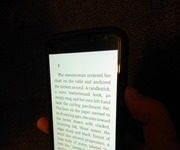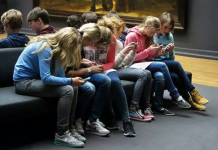 The book is on fire, a period of hot speculation and rapid innovation. If this period is a book burning we cannot say that it is censorship. After all, the e-book is just a new format of the book. The content is still right there, see? Does format matter? From the view of physics nothing is lost in a fire. Energy is not created or destroyed; it is transferred from one form to another. Small consolation to the person whose house has burned down. Transition always entails loss to those invested in the old way. A way of life was comfortable and loved. The new order defines a new set of have-nots. A set of skills and jobs are no longer valued; for some it is too late to learn the new way. Identities as people of the book now seem quaint and nostalgic. People adapt, even bravely embrace change, but do not say that there are only gains and no losses.
The book is on fire, a period of hot speculation and rapid innovation. If this period is a book burning we cannot say that it is censorship. After all, the e-book is just a new format of the book. The content is still right there, see? Does format matter? From the view of physics nothing is lost in a fire. Energy is not created or destroyed; it is transferred from one form to another. Small consolation to the person whose house has burned down. Transition always entails loss to those invested in the old way. A way of life was comfortable and loved. The new order defines a new set of have-nots. A set of skills and jobs are no longer valued; for some it is too late to learn the new way. Identities as people of the book now seem quaint and nostalgic. People adapt, even bravely embrace change, but do not say that there are only gains and no losses.
Does the fire burn deeper? Writing evolved over five thousand years, gradually tuned to the structures of the brain. The invention of the codex two thousand years ago was one of the adaptations. It is hard to fully appreciate the role of the codex. Information can be embodied in the data format just as we store unconscious memories in our body. Every data conversion entails loss. It is hard to know what embodied data is missing from the e-book until a future situation calls for it. The book is the sister of thought. Does changing the book change the way we think? It took forty years for e-books to catch on. Forty years is a blink in the history of the book but it is an eon at today’s rate of technological change. Why did it take two generations? Did we have to change how we think in order to read e-books? New books written for the e-book format tend to be shorter in length. Have we learned brevity or are we thinking smaller thoughts?
The history of the book follows a series of technological innovations. In a classic YouTube video, Introducing the Book, a medieval monk calls tech support to learn the new technology, “Compared to the scroll it takes much longer to turn the pages the book.” Surely no one misses the scroll so why worry about the codex? I wonder about the connection between the codex and religion. The Christians adopted the codex for the Bible and are credited with its widespread adoption. The e-book is more like the scroll, lacking the quick parallel access to pages of the codex. Does the change back to the scroll indicate shifting views on religion? Is it causing them? Is there some other root change that drives both?
The shift from print codex to e-book is not a neutral change in format. Concomitant entities of the book include our brains, intelligence, reading, writing, publishing, libraries, and all other facets of literacy. Literacy is at the heart of our culture and identity. We are experiencing a cultural transition from the print codex to the e-book. The I, Reader series digs out some of the less obvious changes that go with that transition. Perhaps we can preserve more of the benefits of old literacy in the new world.


































I think the reason ebooks took so long to catch on was simply that it took that long for the technology to evolve to the point where the ebook reader was cheap enough and the eink technology made it possible for us to read on screen without getting eye strain. The only thing I miss with the ebook experience is the ability to flip back a few pages or chapters easily to check something. Going through a table of contents to go back a few chapters is cumbersome compared to the paper turning. But the ebook has many advantages over the old technology which make up for that: built in dictionary and search functions, note taking etc, all of which are powerful teaching and learning tools as well as enhancing the reading experience. When you add portability and the ease of purchase – what can I say? I own thousands of paper books but I love my Kindle!
With the right touch e-reader pop-up navigation window, going back a few pages or jumping to a random chapter can be as easy as with a printed book. The speed is limited by the time to do a page refresh.